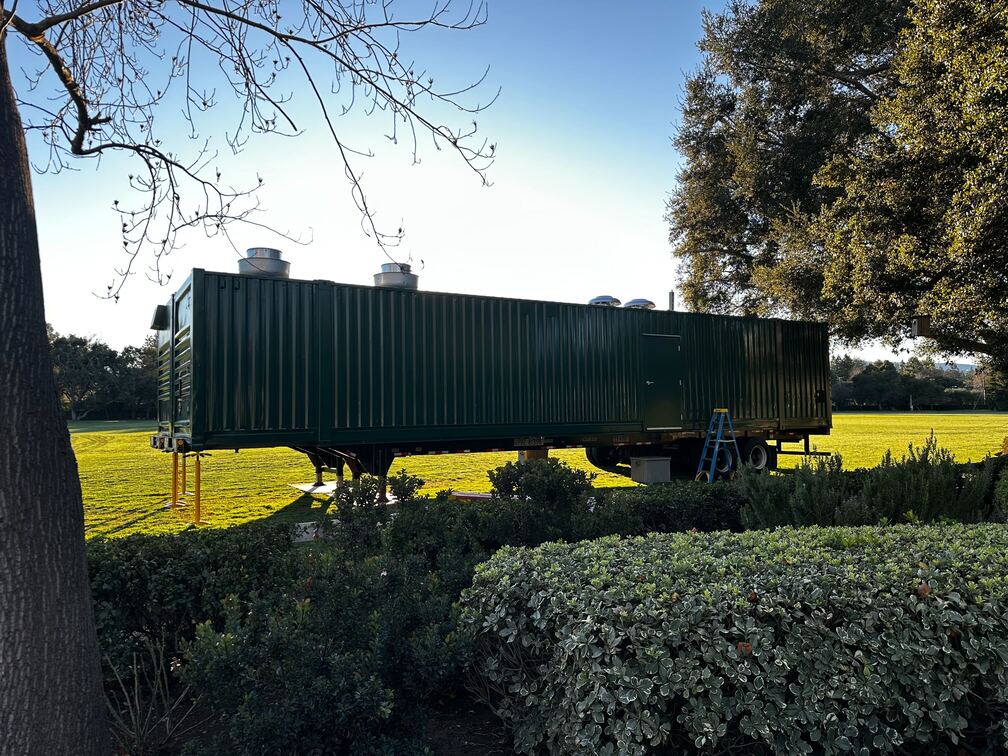
Introduction
Did you know that failing a local health inspection can shut down a mobile kitchen operation in under 24 hours?
Operating a mobile kitchen isn’t as simple as setting up shop on wheels, it requires strict adherence to a patchwork of local, state, and federal regulations. Whether you’re deploying a mobile kitchen trailer for renovation support, special events, or emergency response, knowing the rules is critical to success.
This in-depth article outlines the essential permits, health codes, and safety standards that apply to commercial mobile kitchens. Plus, we share how Mobile Culinaire helps you navigate these regulatory challenges with fully compliant, ready-to-deploy kitchen solutions.
Why Regulations Matter for Mobile Kitchen Trailers
The appeal of a mobile kitchen rental lies in its speed, versatility, and cost-efficiency compared to building or retrofitting permanent facilities. These flexible commercial kitchen solutions allow foodservice operators to launch quickly, test new markets, or maintain operations during renovations and emergencies. If you’d like a deeper look at how they are the perfect temporary kitchen solution, read our article here.
Mobile kitchens, from compact food trailers to large-scale commercial units, are subject to the same (or stricter) regulations as brick-and-mortar restaurants. These regulations exist to protect public health, prevent fires, and ensure safe food handling in unpredictable environments.
Note: Even if you rent a fully outfitted mobile kitchen, the responsibility for compliance falls on you as the operator. This means you must secure the right permits and pass inspections before serving your first meal.
According to the FDA Food Code, mobile kitchens must have:
- NSF-certified equipment and food-contact surfaces
- Functional handwashing stations
- Proper refrigeration and waste disposal systems
- Pest control measures
- Safe food storage and temperature monitoring
Failure to meet these standards can lead to fines, forced shutdowns, or worse: serious illness among your customers. According to the Centers for Disease Control and Prevention (CDC), 1 in 6 Americans (48 million people) get sick from foodborne illnesses each year. Regulations exist to prevent these incidents and protect public health.
.jpeg)
Key Regulatory Areas for Mobile Kitchens
Food Safety Standards
Foodborne illness outbreaks are often traced back to improper storage or preparation. The FDA Food Code and local health departments enforce requirements such as:
- Cold holding: Refrigeration units must maintain perishable foods at 41°F or below. Continuous monitoring with calibrated thermometers is required.
- Hot holding: Cooked foods must be held at 135°F or above until served to prevent bacterial growth.
- Cooking temperatures: Proteins must reach safe internal temperatures, such as 165°F for poultry and 155°F for ground meat.
- Reheating: Leftovers must be reheated rapidly to 165°F within 2 hours.
- Cross-Contamination controls: Separate cutting boards and prep areas are essential for raw and ready-to-eat foods.
- Employee hygiene: Staff must wash hands frequently, wear clean garments, and avoid working while sick.
Tip: Download the FDA Food Code Summary to keep a reference in your kitchen binder.
Note: Some states, like California, also require a commissary agreement for cleaning, supply storage, and waste disposal.
Fire Suppression and Ventilation
Cooking with open flames and hot oils in confined spaces poses serious hazards. The NFPA 96 Standard governs ventilation and fire safety systems in commercial mobile kitchens.
Minimum requirements include:
- Commercial hood hoods: Capture grease-laden vapors over cooking appliances. Filters must be removable for cleaning.
- Automatic fire suppression: Wet chemical systems that automatically discharge when heat thresholds are reached.
- Class K extinguishers: Specifically rated for cooking oil and grease fires, and installed within 30 feet of cooking stations.
- Propane and gas line safety: Lines must be securely mounted, regularly leak-tested, and labeled.
- Ventilation airflow: Sufficient airflow to prevent accumulation of vapors and maintain safe indoor air quality.
Tip: Many fire departments require annual inspections and certification tags on fire suppression systems.
Note: If you’re using propane, confirm your rental’s tanks meet NFPA 58 requirements.

Sanitation and NSF Certification
A clean, sanitary environment is mandatory. Health departments expect:
- NSF-certified equipment: All food-contact surfaces and appliances must carry NSF certification to demonstrate they meet sanitation and material safety standards. This includes prep tables, sinks, refrigerators, and shelving.
- Three-compartment sinks: A designated area to wash, rinse, and sanitize utensils and equipment is mandatory.
- Handwash stations: Each mobile kitchen must have at least one handwashing sink equipped with hot and cold running water, soap dispensers, and disposable towels. In 2016, Boston food trucks racked up 200 violations: half were serious issues like poor hand-washing and sanitation.
- Proper storage: All food and single-service items must be stored at least 6 inches off the floor to prevent contamination from pests and debris.
- Easy-to-clean surfaces: All interior walls, counters, and storage areas must be smooth, non-absorbent, and free of cracks. Materials like stainless steel or sealed composite panels are common choices.
- Pest control measures: Openings must be sealed, and screens installed where required to block insects and rodents.
Tip: Keep daily sanitation logs. The CDC emphasizes consistent cleaning to prevent norovirus outbreaks, the #1 cause of foodborne illness.
Note: Rental kitchens must have surfaces that are non-porous, durable, and easily cleanable.
Utility Compliance
Mobile kitchens need dependable utilities to maintain safety standards:
- Potable water supply: Sufficient capacity to support all cooking, cleaning, and handwashing needs. Tanks must be food-grade and protected from contamination.
- Wastewater containment: Greywater tanks must be at least 15% larger than freshwater tanks. Disposal must occur at approved sites.
- Electrical systems: Installed by licensed electricians in accordance with the National Electrical Code (NEC). Overloaded circuits and exposed wiring are common violations.
- Lighting: Bright enough for safe food preparation (minimum 50 foot-candles in work areas) and shielded to prevent bulb breakage.
- Hot water heaters: Sized to deliver a continuous supply for dishwashing and handwashing.
Tip: Label all tanks clearly. Health inspectors frequently cite unlabeled or cross-connected systems.
Note: Generator noise and emissions are regulated by many cities so make sure to check local ordinances to avoid fines or operational limits.
.jpeg)
Zoning and Location Regulations
Even with all other permits, you must confirm where your mobile kitchen trailer can legally operate.
Common zoning rules include:
- Distance restrictions: You may need to be at least 100–300 feet from schools, hospitals, or existing restaurants.
- Temporary use permits: Required if you plan to operate on private property longer than a set number of days (e.g., 30–90 days).
- Public right-of-way rules: Sidewalk and street vending often requires separate permits and may be prohibited in certain districts.
- Operating hours: Many cities limit service between 10 p.m.–6 a.m. in residential zones.
Tip: Contact your city’s planning department or consult the zoning maps on their website (e.g., Los Angeles Zoning Information).
Note: In Florida, your state-issued food license doesn’t override local zoning approvals or business tax requirements.
Accessibility and ADA Compliance
Mobile kitchens must be accessible to all customers under the Americans with Disabilities Act (ADA). Core requirements typically include:
- Wheelchair-accessible entrances and paths: Clear, unobstructed routes to service areas.
- Service counters no higher than 34 inches: To allow customers to order and pay comfortably.
- ADA-compliant restrooms (if restrooms are provided): With appropriate fixtures, grab bars, and turning space.
- Signage and clear floor space: Proper labeling of accessible features and adequate turning clearances inside the unit.
Failure to comply can lead to fines, legal action, or costly retrofits.
Tip: Consult your local building department or an ADA specialist to review your kitchen layout before finalizing permits.
Licensing and Permitting Requirements
Securing all permits is often the most time-consuming part of starting up. Typical requirements include:
- Business License: Required to legally conduct commercial activities and collect sales tax; must be renewed annually.
- Food Establishment Permit: Issued by your local health department after plan review and inspection.
- Fire Department Approval: Verifies suppression systems, extinguishers, and safe egress pathways; often requires annual re-inspection.
- Commissary Agreement: Confirms you have an approved base for cleaning, storage, and waste disposal.
- Event or Temporary Permits: Required for fairs, festivals, or temporary sites (usually valid 7–30 days).
- Health Department Plan Review: Typically includes floor plans, equipment specs, proposed menu, and standard operating procedures.
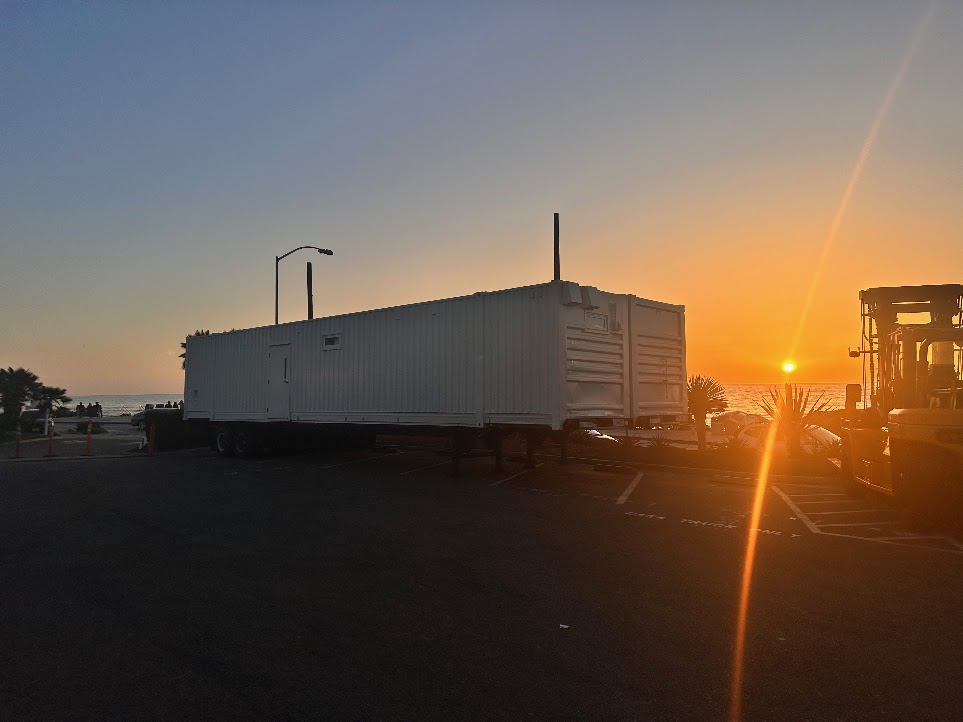
Common Pitfalls and How to Avoid Them
Treating Rental Units as Automatically Compliant
Many operators assume that renting a fully equipped mobile kitchen guarantees automatic approval from local regulators. As the Boston study shows, mobile kitchens are more likely to be shut down for health risks than restaurants. Don’t assume equipment compliance guarantees regulatory approval, ongoing checks and maintenance are critical.
How to avoid it:
Verify whether the kitchen meets your local health, fire, and zoning standards. Even if your rental provider supplies certified equipment, you still need permits and inspections in every new jurisdiction where you plan to operate.
Overlooking Commissary and Wastewater Requirements
A frequent oversight is assuming your kitchen can operate independently without a commissary or approved waste disposal plan.
How to avoid it:
Secure a commissary agreement before applying for your health permit. Make sure you have a plan for daily cleaning, restocking, and proper wastewater disposal as this is a top reason permits are delayed or denied.
Underestimating Documentation Needs
Some operators neglect to prepare required documentation like employee training records, sanitation logs, or equipment certifications.
How to avoid it:
Create a compliance binder that includes your operational permits, NSF certificates, fire suppression records, and employee certifications. Inspectors often require immediate access to these documents.
Assuming One License Covers Every Location
Even if you have an active mobile food permit in one city or county, it does not authorize operation elsewhere.
How to avoid it:
Treat each new service area as a separate approval process. Always confirm with the local health department and zoning office whether your existing licenses are valid before moving your kitchen.
Misjudging the Time Required for Approvals
While renting a mobile kitchen can be fast, permitting and inspections often are not. Delays are common, especially during peak event seasons.
How to avoid it:
Allow at least 4–8 weeks for plan reviews and site inspections. Build contingency time into your project schedule so you’re not forced to cancel contracts or delay openings.
%2520(1).jpeg)
How Mobile Culinaire Ensures Regulatory Compliance
At Mobile Culinaire, every mobile kitchen for rent is purpose-built to meet the highest standards of safety, sanitation, and operational readiness. Our units include:
- NSF-certified appliances and non-porous surfaces to support strict food safety protocols
- Integrated fire suppression systems compliant with NFPA 96 and local fire codes
- ADA-compliant service windows for accessible customer service
- Clearly labeled potable water and wastewater systems for effortless inspections
- Comprehensive compliance packets with equipment certifications, maintenance records, and documentation to streamline approvals
Beyond supplying state-of-the-art mobile kitchens, our team partners with you through every step of the permitting process. From plan reviews to final inspections, we provide hands-on support to reduce administrative burdens and accelerate your timeline.
Conclusion
Navigating regulations for mobile kitchen rentals can feel overwhelming. But with preparation, training, and the right equipment, your operation can stay compliant and thrive. From food safety and fire codes to zoning and permits, each requirement plays a critical role in protecting your customers and your business.
Ready to deploy a mobile kitchen with confidence? Visit our Mobile Kitchen Rentals or Contact Mobile Culinaire to learn more.
People Also Ask (FAQ)
What licenses are needed for a mobile kitchen?
You’ll need a business license, food establishment permit, fire safety approval, and often a commissary agreement. Requirements vary by location so check with your local health department.
Are mobile kitchens subject to building codes?
Yes. Mobile kitchens must comply with building and fire codes, including standards for electrical wiring, plumbing, gas lines, ventilation, and suppression systems. Inspections are usually required before operation.
Can I operate a mobile food trailer anywhere?
No. Zoning laws restrict where you can park and serve food. You’ll often need special permits for public spaces, events, or long-term setups. Always confirm regulations with your local planning department.
Testimonial

"What is standing out when you look at the mobile kitchen operation is the efficiency that we can really achieve because it's built for that."
Tell us about your kitchen needs and request a quote.
.png)
Turnkey mobile kitchen
.png)
Proudly made in-house in the USA
.png)
Commercial grade kitchen equipment
.png)
Code-compliant
Trusted by Industry Leaders



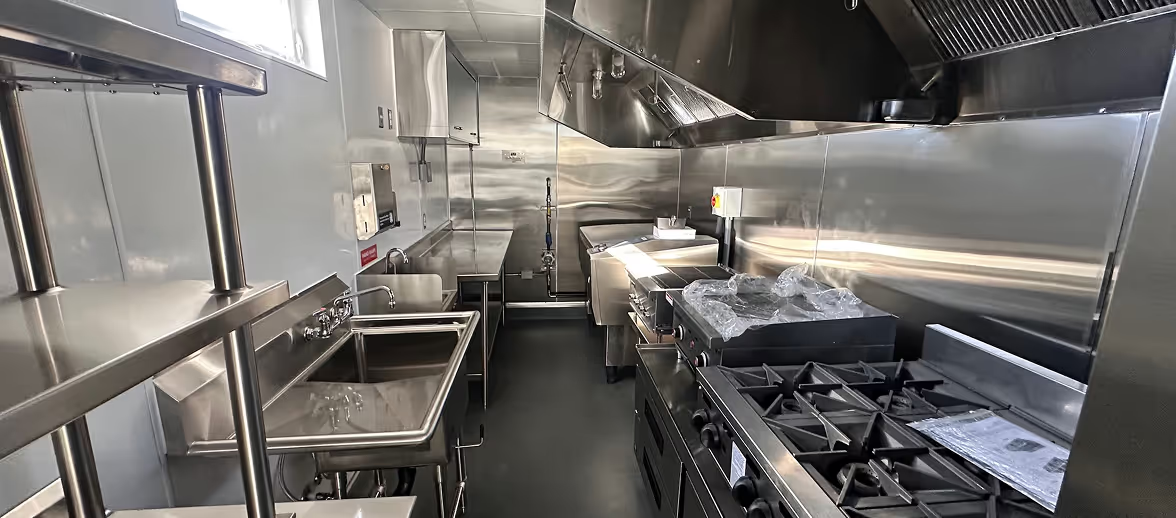
.gif)

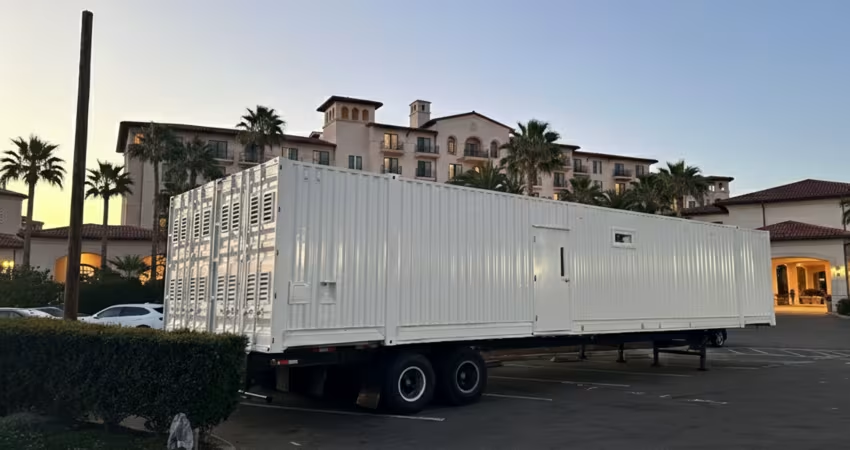
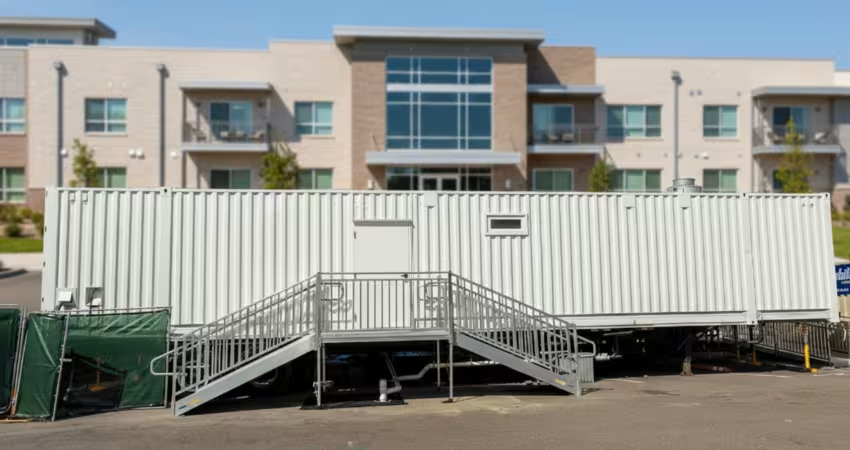
%20(1)%20(1).avif)